|
Believe it or not, I’m a teacher who doesn’t love the summer. Sure, it’s always nice to have a break from the intense days of the school year. But I have always struggled when I don’t have structure in my life. Strange as it might sound, I need someone else to tell where I need to be and when; the break in the routine of the school year that occurs during the summer has always posed a challenge for me and can wreak havoc on my emotional well-being. Here enters summer PD. 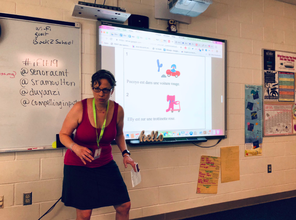 I am participating in six different conferences this summer and the third one, iFLT, just wrapped up in St. Petersburg, Florida. The past five days have been enlightening, empowering, exhausting, and engaging. I had opportunities to work with teachers in so many different capacities, and I relish them all. Not only was I able to share my favorite teaching technique, Movie Talk (or ClipChat), I discussed strategies on reading in the elementary language classroom as well as approaches to making the most of a FLES class despite the challenges many FLES teachers face. Additionally, I had the honor and privilege to coach some incredible teachers and collaborate with a sub-cohort in the beginning track. As I sit on the plane and reflect on the week, I wanted to share my two biggest take-aways.  Take-away 1.5 - a little Memphis Roy love Take-away 1.5 - a little Memphis Roy love 1. While there were so many incredibly masterful teachers at Gibbs High School this week, it is important for ALL of use to remember: there’s only one of each of us. The biggest part of my personality that comes out in my teaching lines most closely with the inimitable Maestra Loca and her energy, Nonetheless, I often find myself trying to channel my inner Grant Boulanger, who possesses a flawless ability to be calm and connect with students simultaneously. I strive to be a blend of those two wiz teachers, with a solid dose of Justin Slocum Bailey’s animation and expressiveness, but I know I can’t BE any of them. (NB-These specific qualities of these teachers are not necessarily what I could consider each of their strengths. I just believe that these particular traits, combined together, create the teacher identity I think works for me and my students.) Each of us needs to take the skills and strengths that we admire in other teachers and create our own unique teacher persona. You do YOU, that’s what your students need! 2. “Repetition and novelty are not mutually exclusive.” As teachers of acquisition-driven instruction, we are aware of the importance of repetition. Simultaneously the brain craves novelty (as Carol Gaab taught me). I have developed ways in which I can “do” the “same thing” multiple times with my classes, but it’s never really the same. My students can read a text after doing a Movie Talk and follow with activities with sentence strips from the text, putting them in order or associating them with images from the video. Throw in a dictation and finish up with a Socrative assessment, and I have recycled and reused the text in multiple ways, allowing my students to process the text differently each time. (If you're not sure what Socrative is, check it out; it's a free website that has some amazing assessment tools. You can watch my tutorial video here.) Above is an outline of how I structure working with texts with my younger students. It’s pretty formulaic but I strongly believe that this scaffolded progression of activities allows for the slow and deliberate transfer of output from the teacher to the student. When my students can describe pictures without any prompting from me or read sentences in a story book they are illustrating and know what they need to draw because they have worked with the material so much in different ways, I can see that they are really learning and acquiring language.
Once my plane lands Boston in an hour, it will be less than 24 hours until I find myself at Logan once again to take off for conference #4 in Agen, France. This is yet another opportunity to see other teachers in action and pull what I love from their teaching and personalities to create me. May the rest of your summer, regardless of how much is left, bring you the restoration you deserve! Bises.
1 Comment
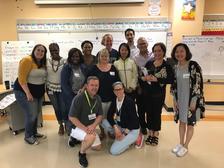 After returning from iFLT18 this year, I noticed a different post-conference feeling. When I first began my CI journey eight years ago, I remember leaving big conferences with a full and exhausted brain. There was so much information and so many amazing ideas, I felt like I was walking around in a stupor. What should my take-aways be? What's most important? Where do I begin?!?! It was critical for me to remember to start small: implement one or two specific ideas into my lessons. Every journey begins with a single step, right? At the same time, the big ideas presented at these conferences helped me to develop my philosophy and shift my approach to my teaching. I knew what I wanted to do, and why I wanted to do it. Nonetheless, I was still overwhelmed. Now I feel like I'm at a point where I walk away from days upon days of sessions and workshops energized. Seeing teachers in action allowed me to reflect on my own practice. And yes, I certainly had the doubt that Megan Hayes mentions in her post-iFLT blog post. But when I flip the post-conference-thinking coin, I find excitement the other side. Apprenticing under the amazing Paul Kirschling during adult French beginner language lab was one of the most powerful experiences of my career. I received direct feedback on my teaching from a seasoned CI French teacher. (How often does THAT happen?) My co-apprentice teacher, Blair Richards, wrote up her reflections on her blog.  I have some concrete changes I would like to make in my classroom when the students return. Last year was a particularly challenging year for me, so I'm excited to feel optimism and enthusiasm about teaching filling my soul. The pre-school adrenaline has begun to pump through my veins. (But don't worry, I have PLENTY of summer left to enjoy, including celebrating my 40th birthday.)  I hope that all of you who attended iFLT this year (thank you Teri and Carol!) can find that excitement in all of that post-conference "overwhelmedness." For those of you who were not able to attend, it's a unique and powerful conferences and I hope you will have the chance one day soon. (And New Englanders/Northeasterners who are unable travel thousands of miles, there's a wonderful opportunity right around the corner at Express Fluency's summer teacher training in Vermont. I'll be there this year, dragging Movie Talk with me! You'll also be able to see Annabelle Allen and Justin Slocum-Bailey in action (two amazing teachers whom I'm lucky to call dear friends), as well as Martina Bex, Tina Hargaden, and Mike Peto. In the meantime, may the CI force be with you. Bisous.  I had the amazing opportunity to apprentice teach beginning French under the tutelage of the incredible Paul Kirschling, and work alongside Blair Richards at iFLT this summer. While I walked away with so many ideas and thoughts, the one that really stuck is the importance of going S-L-O-W-L-Y. For those of you who know me, you probably understand how difficult this is for me. My personality is such that I get super excited and carried away, and, as a result, talk super fast. But it took something as concrete and direct as "STFD" for me to really internalize the idea. (No joke, I literally wrote those letters on my hand during my teaching at iFLT as a reminder.) And some of you may have seen this photo on the Interwebs of the visual I created for my classroom to get me to, well, you know... When I took a step back and thought about the importance of slow, I thought about my students. My high-flyers can keep up with me and enjoy my "carried-away-ness." However, I risk leaving a lot of students behind when I go too quickly. And what good is it to teach when you're losing kids? I love my work, and I hope that shows in my teaching. But if I get so wrapped up in what I'm actually doing and move too fast (as I am wont to do), in the end, I won't be comprehensible, or successful. And that's a humbling thought. (PSA-The idea of slow really hit me hard when I was a student in Linda Li's Mandarin class at NTPRS in 2012. Being a student in a language that isn't one that I know was essential to my understanding of slow. If you have never had the experience of being a language student, find a way to do that ASAP. Seriously. It's a game changer.) In addition to seeing Paul, the master of slow, work his magic at iFLT, I was also able to observe several other teachers at the Express Fluency conference in Vermont this summer who embody slowness: Tina Hargaden, Justin Slocum Bailey (who, incidentally has a blog post on this exact idea), and Elissa Maclean. Check them out, and then come back here in a couple of months. I plan on filming and posting more of my classes this year to hold myself accountable with respect to my speed. I hope that this gentle reminder to STFD helps you reach all of your students and keep yourself grounded and, in the end, comprehensible. Bises. |
AuthorAllison Litten, the 2019 VFLA TOY, teaches French at the Marion Cross School, a public PreK-6 school in Norwich, Vermont. This is her twenty-third year teaching, and twentieth at Marion Cross. Archives
May 2023
Categories
All
|

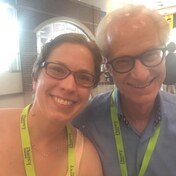
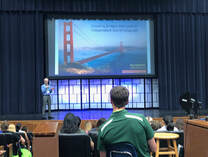
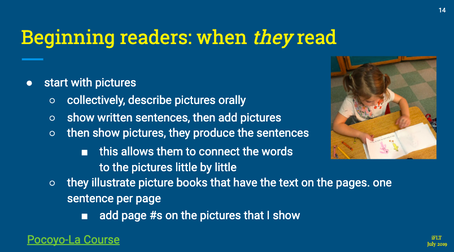
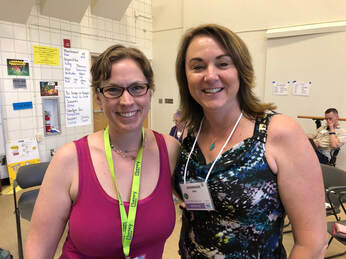
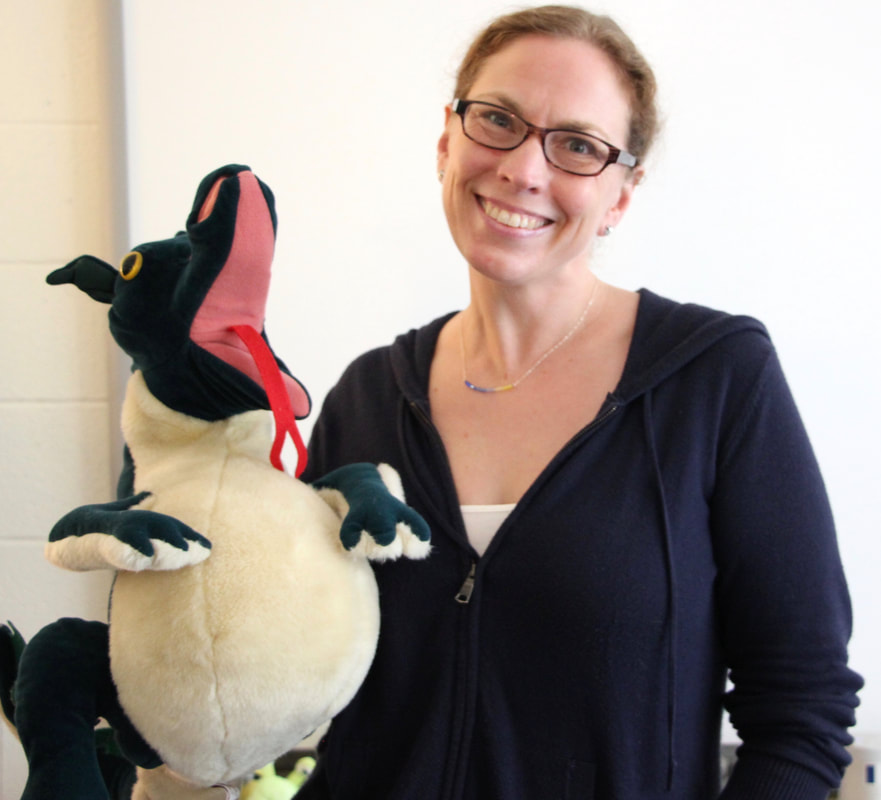
 RSS Feed
RSS Feed
